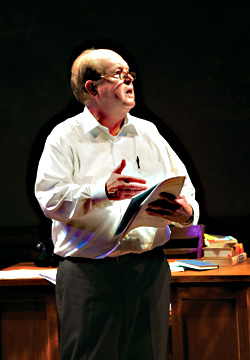John Aylward is an unlikely film and television star. His big bold head is an interesting cross between a banker’s and a bulldog’s, and it’s all of one color, like a rare steak. His body is large and well furnished, and there’s an interesting hint of muscle somewhere under there. “I’m not leading-man material, nor was I 40 years ago,” he says cheerfully. “But my age finally caught up with my face.”
Yes, you’ve probably seen him on ER (where he played Dr. Anspaugh for six seasons) or The West Wing (where he was former DNC chairman Barry Goodwin in Season 6), but if you want a portrait of how much an actor can work in a decade, give his name a quick run at IMDb. There you’ll find recurring roles in a half-dozen other shows (including Boston Legal and The Practice) and more film appearances than seems feasible. “At one time I was guesting on about five shows at once,” he remembers. “That was fun.” It made me wonder: This is the guy I occasionally run into at my neighborhood QFC? Really?
Born and raised in Seattle, Aylward was an early graduate of the UW’s theater program and a founding member of the Empty Space. When I came to Seattle in 1996, Aylward was an established and much-loved figure on local stages, particularly at Dan Sullivan’s Seattle Rep. That’s where I saw Aylward play the tyrannical analyst in John Patrick Shanley’s Psychopathia Sexualis, a minor bit of fun from a playwright who’s done better work since, but a huge break for the actor. When the show transferred to the Mark Taper Forum in L.A., his fearsome performance was seen by one of the producers of ER and inspired the character of Anspaugh. In the 10 years since, whenever a character with some fiery gravitas is required (which turns out to be practically every episode of your typical cop and lawyer shows), Aylward has been the go-to guy.
With the writers’ strike in full force, Aylward is back in Seattle, featured in Seattle Rep’s world premiere of The Breach, a tri-authored play that weaves together three different stories about the flooding of New Orleans. While the timing was fortuitous for the busy actor, he’s been enthusiastic about the script from the beginning. “I read it and I thought, this play captures the zeitgeist better than any script I’ve ever read.”
Aylward plays a man crippled by MS who must leave his wheelchair to swim out into the toxic muck rising about him. It’s a role that suits an actor who regularly demonstrates that acting is a physical action, not just an intellectual exercise. In his performance last year in ACT’s First Class, a solo play in which he embodied the troubled poet (and UW teacher) Theodore Roethke, he showed sides of himself I’d never seen before. Speaking directly to the audience, he was charming and avuncular, but later, drunk and lecherous at a cocktail party, he showed depths of self-loathing that one suspects come from an intimate familiarity with his own inner demons.
Aylward is grateful that his roistering youth was spent in Seattle, and that his L.A. chapter didn’t start till he was 50. “If I’d gone to Los Angeles in 1975, I would probably have lived three years. All the clichés about that city are true. If you’re not careful, you can just get chewed up and spat out. I went to an audition when I first showed up and Rod Steiger was [there]. Rod Steiger! The Pawnbroker, and he’s just another jobbing actor at an audition. Something’s wrong with that.”
Aylward doesn’t do theater in L.A., and he admits that the eight-shows-a-week schedule demanded by regional theater isn’t as appealing as the quick shoots of TV and film. Still, it’s a relief to take on a role that isn’t a formidable lawyer or a headstrong doctor.
“Yeah, it’s frustrating. Had somebody seen me in [Molière’s] The Miser instead of Psychopathia Sexualis, I might have had a completely different career in the last 10 years. In the theater you can get a reputation where people say, ‘He can do anything! Get him for anything!’ That doesn’t really happen in TV and film.” But Aylward’s very aware of his good luck, living in a city he loves and with steady demand from Hollywood.
As we finish our interview, Aylward asks my opinion about his recent performance in First Class. I enjoyed it and tell him so in detail. He listens, then nods. “I used every crayon in the box for that one,” he says. It’s a moment of rare vulnerability from this seasoned actor, and it makes me all the more eager to see which colors he chooses for The Breach.








